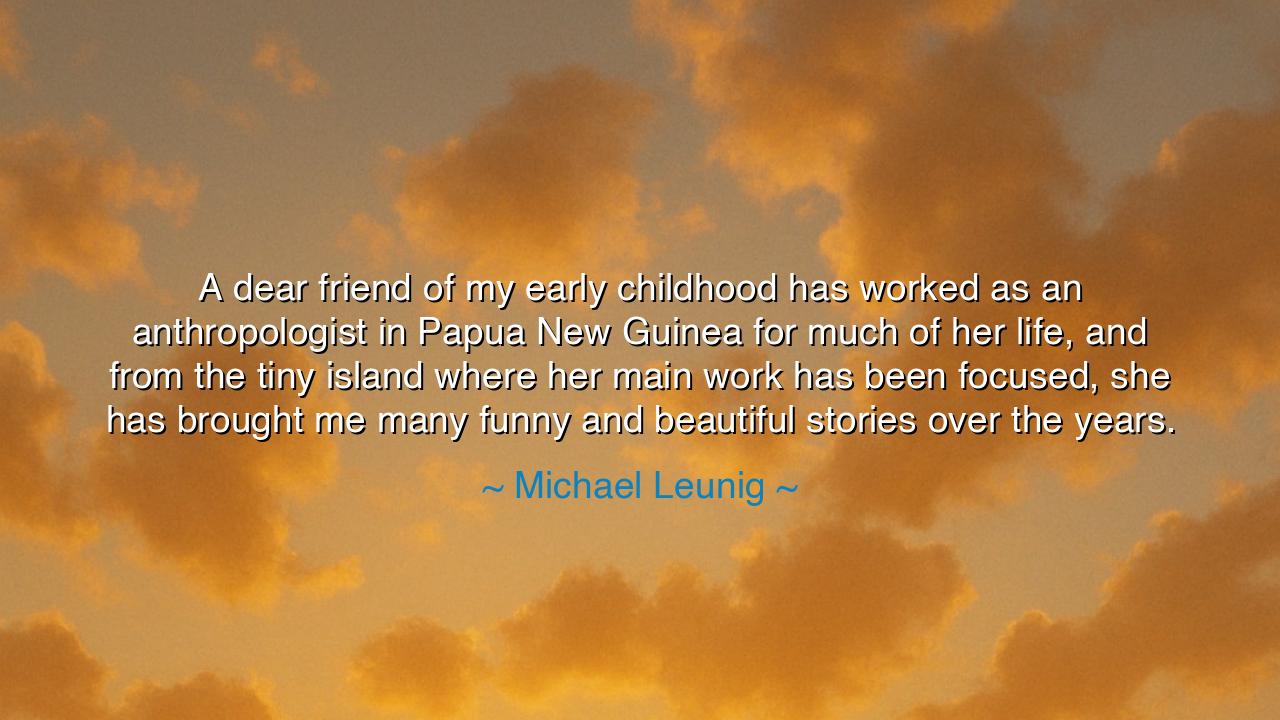
A dear friend of my early childhood has worked as an
A dear friend of my early childhood has worked as an anthropologist in Papua New Guinea for much of her life, and from the tiny island where her main work has been focused, she has brought me many funny and beautiful stories over the years.






Hear, O seekers of wisdom and wonder, the words of Michael Leunig, poet, philosopher, and painter of the human heart. He once said: “A dear friend of my early childhood has worked as an anthropologist in Papua New Guinea for much of her life, and from the tiny island where her main work has been focused, she has brought me many funny and beautiful stories over the years.” These words, gentle and unassuming, carry within them a treasure chest of meaning. For they speak not only of friendship, but of the sacred exchange between the familiar and the foreign, between the listener and the storyteller, between the stillness of home and the vastness of the world.
In this quote, Leunig does not merely recall a friend; he celebrates the bridge between worlds. His companion, an anthropologist dwelling in the distant isles of Papua New Guinea, brings back to him tales of laughter, strangeness, and grace—stories that shimmer with the spirit of a people far removed from the noise of modern civilization. These are not just “funny and beautiful stories”; they are fragments of human truth, carried across oceans and given as gifts. Through her, Leunig glimpses another rhythm of life—one unmeasured by clocks or commerce, where humor and beauty still flow from simplicity and connection.
This is the way of the ancient story-bearers, those who venture into the unknown and return with the sacred fire of knowledge. In older days, they were called messengers, prophets, or bards; in Leunig’s time, they are the anthropologists and artists who walk among different cultures not to dominate or judge, but to understand and to honor. His friend becomes such a figure—an emissary between worlds, translating the laughter of island children and the quiet dignity of their customs into tales that feed the soul of one far away. Through her, Leunig reminds us that the world is one great conversation, and that to listen is as noble an act as to speak.
Consider, if you will, the story of Herodotus, whom the Greeks named “the Father of History.” He wandered across lands strange and wondrous, gathering the stories of others—their myths, their rituals, their wisdom. When he returned, he wove those stories into a tapestry that revealed not only the deeds of kings but the spirit of humanity itself. Like Leunig’s friend, Herodotus did not seek conquest but understanding. His purpose was to reveal that though our customs differ, our hearts beat to the same rhythm. And in this same way, Leunig listens—his art and poetry born not from isolation, but from the meeting of souls through story.
There is a tenderness in his choice of words: “funny and beautiful stories.” For what could be more sacred than laughter and beauty entwined? The funny reminds us of our shared humility—the absurd, the small, the delightful foolishness that makes us human. The beautiful reminds us of transcendence, of the divine breath that passes through all living things. When Leunig’s friend shares these stories, she offers him not facts but moments of grace, glimpses into the eternal comedy and tragedy of being alive. Through her, he remembers that wisdom is not always solemn, and that joy is often the purest teacher of all.
In a world that hungers for speed and certainty, this exchange of stories stands as a quiet act of resistance. It tells us to value the storyteller, to cherish the friendships that expand our vision, and to find holiness in the laughter of others. Leunig’s reflection is not just nostalgia—it is a reminder that our understanding of the world grows not through data, but through empathy. It is the stories we share—the ones that make us smile, weep, or wonder—that weave the invisible net of human kinship across oceans and centuries.
So, my child of listening and learning, take this lesson to heart: seek not always to speak, but to receive. Find the storytellers in your life, those who return from far-off places, whether lands of travel or lands of the soul. Listen to their tales of beauty and absurdity, for through them you will come to know not only the world, but yourself. And when your own journey calls you forth, remember to bring back stories of your own—to tell them with tenderness, to share them with laughter, and to offer them as gifts to those who stayed behind. For in the end, it is through such stories that humanity remembers what it means to be one people beneath the same sky.
Thus, Leunig’s words, soft as a whisper, become a call to every heart: cherish friendship, honor curiosity, and recognize that the stories we exchange are the lifeblood of understanding. From one island to another, from one soul to the next, may our tales—funny, beautiful, and true—continue to cross the waters of time, keeping alive the light of wonder that unites us all.






AAdministratorAdministrator
Welcome, honored guests. Please leave a comment, we will respond soon